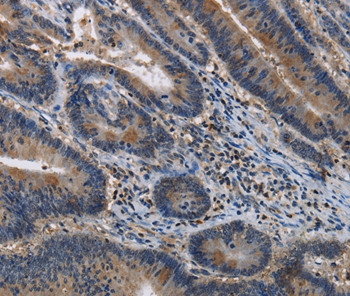Product Detail
Product NameITPR2 Antibody
Host SpeciesRabbit
ClonalityPolyclonal
PurificationAntigen affinity purification.
ApplicationsIHC
Species ReactivityHu
SpecificityThe antibody detects endogenous levels of total ITPR2 protein.
Immunogen TypePeptide
Immunogen DescSynthetic peptide corresponding to a region derived from internal residues of human inositol 1,4,5-trisphosphate receptor, type 2
Target NameITPR2
ConjugateUnconjugated
Other NamesIP3R2
Accession NoSwiss-Prot#: Q14571
NCBI Gene ID: 3709
Gene Accssion: NP_002214
Uniprot
Q14571
Gene ID
3709;
Concentration2.6mg/ml
FormulationRabbit IgG in pH7.4 PBS, 0.05% NaN3, 40% Glycerol.
StorageStore at -20˚C
Application Details
Immunohistochemistry: 1:50-1:200
Immunohistochemical analysis of paraffin-embedded Human colon cancer tissue using #37666 at dilution 1/40.
Inositol 1,4,5-triphosphate (IP3) functions as a second messenger for a myriad of extracellular stimuli including hormones, growth factors and neurotransmitters. Receptor tyrosine kinases indirectly increase the intracellular levels of IP3 through the activation of phospholipases such as phospholipase C (PLC), which convert phosphatidylinositol-4,5 bisphosphate into IP3 and diacylglycerol (DAG). The inositol 1,4,5-triphosphate receptor, IP3R, acts as an inositol triphosphate (IP3)-gated calcium release channel in a variety of cell types. Three IP3 receptor subtypes have been described and are designated IP3R-I, IP3R-II and IP3R-III. IP3R-I is the predominant IP3R subtype expressed in neuronal tissues and the central nervous system, but is also expressed at high levels in the liver.
If you have published an article using product 37666, please notify us so that we can cite your literature.
et al,Proteomic characteristics reveal the signatures and the risks of T1 colorectal cancer metastasis to lymph nodes
, (2023),
PMID:
37158593



 Yes
Yes



